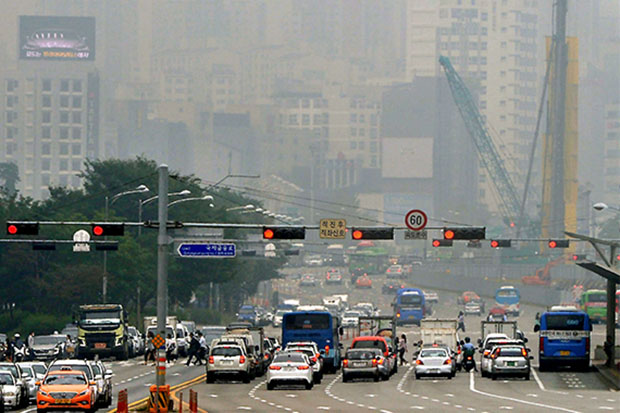
Old diesel vehicles will be banned from running on the roads in Seoul and satellite cities from December to March when fine dust usually worsens and in the worst case, maximum 27 coal-fueled power plants would be plugged off to ensure air pollution at safe levels.
The National Council on Climate Change and Air Quality on Monday announced a set of policy measures to confront pollution issues that were submitted to the presidential office last week for review, Pulse reported. The government plans to revise related law before enforcing policies starting November, it added.
There may be minor adjustments made to the presidential council’s policy proposal but the measures in general will be implemented unchanged, said an unnamed official from the National Council on Climate Change and Air Quality.
Under the measures, old diesel vehicles will be banned from the roads in Seoul and metropolitan areas with 500,000 or more population when fine dust levels are high between December and March. Diesel cars necessary to make a living can be exempted.
Vehicles with odd-number license plates will have stay behind on even-numbered dates, and vice versa, when weekly dust pollution is forecast to reach alarming level.
Operations of up to 27 coal-fired thermal power plants will be stopped during the period. Through the statutory actions for December-March period is expected to curtail air pollution by more than 20% or 23,000 tonnes, the council said.
The government will send more than 1,000 private-public inspection teams to 44 industrial complexes across the country to strictly monitor illegal emissions. Operations of some coal-fired power stations will be moderated according to pollution gravity.
Six coal-powered thermal power plants will be plugged off by rotation — units 9 to 14 from December to February and units 22 to 27 in March. Operation ration of other plants will be kept at 80%.
Measures introduced by the presidential council also include enhancing air pollution monitoring of construction sites and illegal incineration in rural areas as well as introducing coordinate actions with neighboring countries such as China and enhancing air pollution forecast such as by disclosing fine dust compositions.
The measures were drawn up by five expert committees of 130 professionals under the council as well as a group of 500 national policy participation personnel after five months of discussion and deliberation. The council received opinions of various consultative bodies from the government, regional governments, and industry groups to come up with solutions to reduce fine dust concentration.
The National Council on Climate Change and Air Quality plans to hold town hall meetings to promote the measures and come up with its second set of mid- to long-term measures.
Ban Ki-moon, the former United Nations secretary general who heads the National Council on Climate Change and Air Quality, said that the latest measures are “very realistic ones that have not been proposed so far” and that they will lead way to “fundamental solutions for fighting climate change and air pollution.”